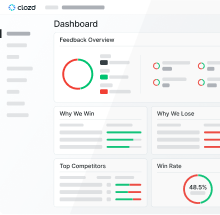Create a culture centered on truth-telling and consistent improvement
Winning is a collective effort. Too many companies, however, silo their data. It’s easy for insights to lose their power when they’re trapped in a spreadsheet. According to our State of Win-Loss Report, 68% of companies that distribute win-loss data to at least half of their employees report an increase in their win rate. It's clear that sharing win-loss insights broadly is a key part of running a successful program.
Product Marketing
.svg)
Understand what buyers in your market care about—and why
.svg)
Identify emerging competitive threats and growing industry trends
.svg)
Gather data on existing product features, functionality, and GTM approach
Sales
.svg)
Understand why you win and lose (so you can win more and attain quota)
.svg)
Coach and train on deficiencies; replicate winning strategies
.svg)
Identify win-back opportunities to prioritize
Product / Engineering
.svg)
Focus on the highest-impact product development areas that will drive revenue
.svg)
Unbiased insights that you can trust (vs. “loudest” voices internally)
.svg)
Direct feedback on existing features and functionality
Customer Success
.svg)
Improve gross retention by understanding why customers are churning
.svg)
Drive cross-sell and expansion to improve net retention
.svg)
Gather data needed to influence product investments and GTM adjustments
Finance / Strategy / BizOps
.svg)
Gather data directly from your customers mouth (vs. signals and signs)
.svg)
Identify gaps where strategy and execution are not matching
.svg)
Use to prioritize (and de-prioritize) investments in key areas of business
Executives / Board
.svg)
Diagnose the biggest revenue inhibitors for your business
.svg)
Unite your org around the activities most likely to drive target outcomes
.svg)
Create a culture of truth-telling and continuous improvement
At Clozd, we’ve managed thousands of win-loss analysis programs, and we’ve seen what it takes to create a culture centered on winning. Consider the following best practices to ensure that you're getting the most out of your program.
Awareness
.svg)
Does this group know what we’re doing?
.svg)
Do they know why we’re doing it?
.svg)
Do they know what questions we’re asking?
.svg)
Do they know how we’re using the data?
Adoption
.svg)
Do they have direct access to the data?
.svg)
Have they been trained on how to best use it?
.svg)
Are they actually looking at it?
Advocacy
.svg)
Are they using the data for their purposes?
.svg)
Are they engaged in the scoping and design of the program?
.svg)
Would they be sad if we stopped?
Awareness
.svg)
Video from CMO introducing Clozd to the whole company
.svg)
SKO / RKO sessions
.svg)
C-suite roundtable discussions with the program manager
.svg)
Direct notifications to sales reps and leaders for their deals
.svg)
General slack channel
Adoption
.svg)
Direct access for whole company—or close to it
.svg)
Training from Clozd functional leaders
.svg)
Slack or Teams channel for specific interview types
.svg)
Department-level discussions quarterly
.svg)
Automated reports to functional leaders
Advocacy
.svg)
Smart Tags set up by each department
.svg)
Board presentations and discussions
.svg)
Interview guide refresh with leaders
.svg)
“Win-Loss Day” as a company
.svg)
Tiger teams set up at the executive level

 Product
Product
.svg)










.svg)




.svg)